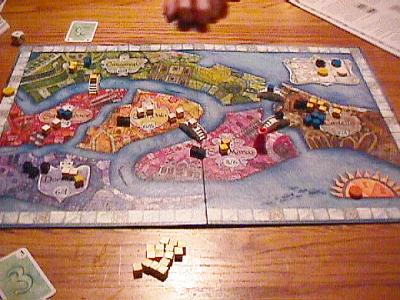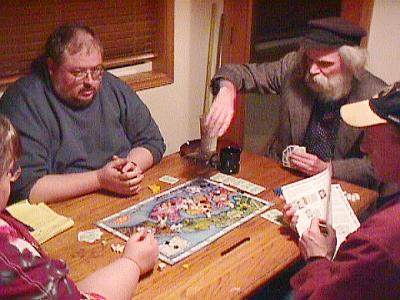![[Home]](https://ludism.org/logo/sclogo160.png)
Last edit
Summary: (SeattleCosmicGameNight[0-9]+) -> \[\[$1\]\]
Changed:
< --["Ron Hale-Evans"], SeattleCosmicGameNight20030208
to
> --["Ron Hale-Evans"], [[SeattleCosmicGameNight20030208]]


Superficially, San Marco is a vanilla MajorityPlacementGame? of the sort I usually avoid, with perhaps a few coloured sprinkles in the form of bridges that can be placed to connect islands and facilitate token placement. However, the heart and soul of the game, the (as it were) coconut, toasted almond, and chocolate chunk mix-ins, are the central "I divide and you choose" method of distributing action and penalty cards among the players. I am so fascinated by "King Solomon's method", also known as "envy-free division", that I have been trying to track down a book about the phenomenon, called Fair Division: From Cake-Cutting to Dispute Resolution by Steven Brams and Alan Taylor. (Here is an article discussing their work. I just realised I've been Googling the book under the title Fair Divisions with an 's', so that's why I've had no luck.) To take envy-free division and turn it into a competitive mechanism in a strategy game has roughly the same effect on me as a Pan-Galactic Gargleblaster on Zaphod Beeblebrox. It seems to have the same effect on others as well; the choices for both divider and chooser are so agonising that John Braley, who had played before, remarked at the start, "This is a delicious game for masochists."
There are three rounds, or "passages" in the game, each of which ends when players accumulate a critical mass of penalty cards. During each passage, a player can score an island by playing a Doge card to bring the Doge to the island (thus making San Marco another game in which one can exclaim, "And I would have gotten away with it too, if it weren't for ThatMeddlingKing!" -- or Doge). Vanilla majority placement rules apply here; you know the routine. But first, on each turn of the round, you either divide action and penalty cards available into stacks or choose among the stacks. The delight comes (as divider) in trying to tempt your opponent into taking some bad cards along with some good (that is, making an offer your opponent can't refuse), or (as chooser) by outsmarting the divider and finding a way to make some strategically sound moves with the stack of cards you know the divider really doesn't want you to have. The second-guessing! The third- and fourth-guessing! ...
I was not disappointed with San Marco, and plan to buy the game while it is still in print. I would have preferred the secondary mechanism to be something other than a MajorityPlacementGame?, probably something more "pure" and abstract, but this is a quibble. Overall, I think it is a superb game, and in a way, an interesting meditation on fairness.
--Ron_Hale-Evans?, SeattleCosmicGameNight20030208
BoardgameGeek page for San Marco
CategoryGamePage?